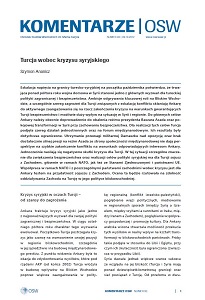Krymski worek bez dna: koszty aneksji półwyspu przez Rosję
Crimean bottomless pit: the costs of Russia's annexation of the peninsula
Author(s): Ewa Fischer, Jadwiga Rogoża
Subject(s): International relations/trade, Security and defense, Studies in violence and power
Published by: OSW Ośrodek Studiów Wschodnich im. Marka Karpia
Keywords: Crimea annexation;
Summary/Abstract: The annexation of Crimea brought significant dividends to the Russian authorities, in particular in the domestic arena, causing unprecedented socio-political consolidation and strengthening the position of Vladimir Putin after several years of declining support. It also provided Russia with strategic advantages, giving it wide access to the Black Sea and to the military infrastructure on the peninsula, as well as natural gas and oil resources. Russia has also taken over numerous facilities (including tourist facilities) owned by the Ukrainian state. However, the very decision to annex Crimea was made by Moscow ad hoc, without calculating the costs of integrating the peninsula with the Russian legal, political and socio-economic system. // Russia has taken over the region previously subsidized from the Ukrainian budget, and the annexation has hit the most important branch of the Crimean economy - tourism. The process of Crimea's integration with Russia will be complex and will entail high financial, organizational and social costs, including multi-billion-dollar outlays for the modernization and expansion of infrastructure, covering the region's budget deficit, and the payment of social benefits. // For reasons of prestige and politics, Moscow treats the issue of Crimea's integration as a priority; is determined to prove that the annexation of the peninsula will be beneficial for the Crimean economy and will raise the standard of living of the inhabitants. However, the expenses related to the integration of Crimea will coincide with the deteriorating economic situation in Russia, aggravated by the US and EU sanctions, which may lead to the abandonment of some ambitious investment plans or their postponement. Part of the integration costs will be borne by the Russian regions, even though they are struggling with major financial problems, which force them to limit their own investment programs. The fulfillment of the hopes of the inhabitants of Crimea for an improvement in the standard of living is also questionable, including due to the problems of the tourism sector (which is one of the main sources of income for the inhabitants), the increase in the cost of living and problems with supplies, and finally due to restrictions on civil rights after the introduction of more restrictive Russian legislation.
Series: OSW Commentary
- Page Count: 7
- Publication Year: 2014
- Language: Polish
- Content File-PDF

